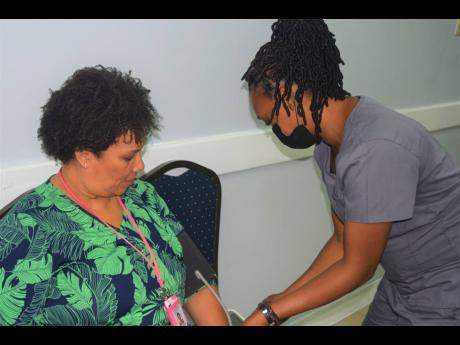SAJ offers free blood pressure screenings on World Hypertension Day
MEMBERS AND staff of the Shipping Association of Jamaica (SAJ) benefited from free blood pressure checks as the company marked World Hypertension Day on May 17.
Dozens of people turned up for the complimentary screenings, which were facilitated by the Newport West Medical Group as part of a global push to increase awareness about the dangers of high blood pressure and its impact on our health and well-being.
Corah Ann Robertson Sylvester, chief executive officer of Seaboard Freight and Shipping Jamaica, took advantage of the SAJ’s offer and shared, “I’m really very happy that the Shipping Association of Jamaica has taken the opportunity to provide this service for its members and their staff on World Hypertension Day. When I was a child, I used to hear the word ‘pressure’ and didn’t know what it meant, but in Jamaica we refer to hypertension, or high blood pressure, as ‘pressure’. It’s a common thing.”
Robertson Sylvester, who is also vice-president of the SAJ, said Jamaicans should take the condition seriously as it may lead to more serious ailments, such as strokes and heart conditions. She added that as part of her own attempts to address the risks, she will make greater efforts to manage her salt intake.
According to the Pan American Health Organization, high blood pressure is the main risk factor to develop cardiovascular disease. Often referred to as the ‘silent killer’, more than one billion people around the world live with hypertension, half of whom do not know, as it may have no warning signs or symptoms.
If left untreated, the effects of high blood pressure may include vision loss, heart attack, kidney damage, erectile dysfunction, and congestive heart failure.
The National Health Fund is encouraging Jamaicans to adopt lifestyle changes which can help to control their blood pressure. These include leading an active lifestyle, limiting alcohol use, eating a healthy diet, maintaining a healthy weight, and not smoking.
People are also advised to read product labels, as three-quarters of the salt consumed daily is hidden in the foods we consume. The recommended amount of salt is about one teaspoon each day.

